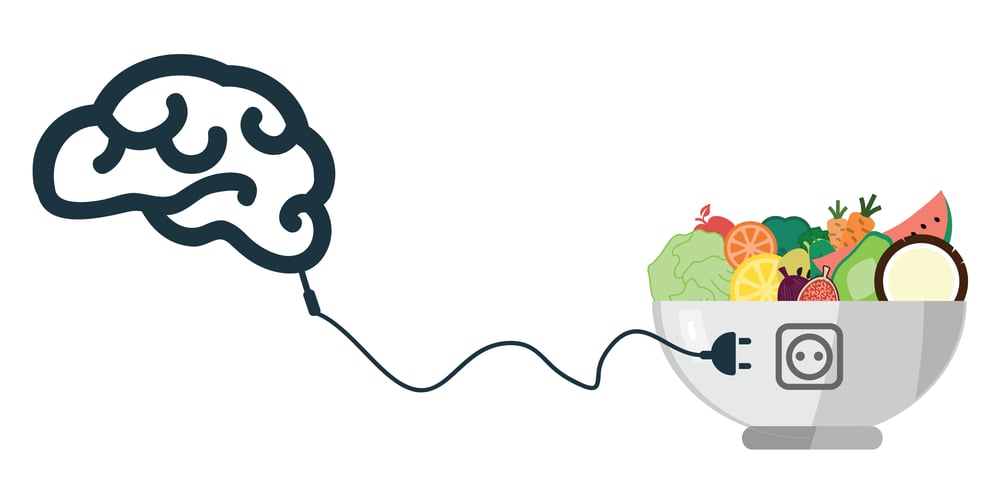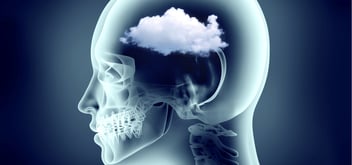Healing Brain Fog with Nutrition
- Home
- Blog

What You Will Learn in this Blog:
- How your gut and your brain “speak” to each other through the gut-brain axis
- Why feeding your gut can feed your brain
- The role of the microbiome in mental health outcomes
- How IBS, Crohn’s, and Celiac disease all have mental health impacts—and what you can do about it
- How microbiome and other dietary tests can help you get to the root of your brain fog
Reader, have you ever heard the phrase, “You are what you eat”? As it turns out, this is no mere metaphor. More and more research is showing that, in fact, the foods we eat have a direct impact on our mental health—and can make a powerful difference between a healthy brain and a foggy brain. If you’re feeling fatigued, forgetful, or otherwise unwell—or if you suffer from depression, anxiety, or other mental illness—the answer to your symptoms may be in a few simple dietary changes. How does diet build a healthy brain? Read more to find out!
What is the role of Nutrition in Mental Health?
The health of your gut and the health of your brain are intertwined so intimately that we cannot have disease states in one area without experiencing imbalances in the other—and that intimate connection is not just a metaphor. You see, our brains and our guts are actually biologically connected through the vagus nerve which runs directly between them. This nerve transports metabolic (nutrients, antioxidants) and neurochemical (neuropeptides and neurotransmitters) components produced in the gut to the brain for use. And like any good highway, the vagus nerve goes both ways, shuttling neurochemicals produced in the brain back to the gut.
In other words, the vagus nerve carries messages back and forth between the brain and the gut every second of the day. That means what goes on in either of these endpoints—gut or brain—directly impacts the other. Further, given that the gut is responsible for digesting and assimilating nutrients, the ability of the gut to do its primary job directly determines the nutrient status of the brain cells that we rely on for our cognition.
Bottom line? As it turns out, you are in large part what you eat. In order to understand how your gut health is related to your brain health and how it impacts a common symptom such as brain fog, we must pay particular attention to the role of the beneficial bacteria that inhabit our digestive tract.
Healthy Microbiome, Healthy Brain… and Vice Versa
The relationship between you and the various microbial communities in your gut, called your microbiome, is one of the most important relationships you sustain throughout your life. Unfortunately, many of us don’t even know we’re sustaining this relationship in the first place! So what, exactly, is the microbiome, and why is it so important to your health?
Your microbiome is a unique and complex ecosystem whose role in health is becoming better understood with each passing year. Scientists and clinicians agree that the microbiome exerts great influence on the health and functioning of the gut, and in turn, your mood, mental clarity, and immune function.
Irritable Bowel Syndrome (IBS) is a great example of what was once considered a gut-related health concern in nervous patients and is now viewed as the result of gut-brain axis dysfunction involving an altered microbiome and stress response. You see, IBS doesn’t just impact your gut: 50-90% of patients suffering from IBS also suffer from psychiatric disorders, most commonly anxiety and depression.
While IBS is caused by many different insults to the gut such as food poisoning, antibiotics, chronic stress, and slow gut motility, the result is an altered microbial balance that leads to increased immune activation and inflammation, decreased production of healthy metabolites like short-chain fatty acids and serotonin, and increased intestinal permeability—all of which have a negative impact on an otherwise healthy brain.
How, exactly, does this occur? Remember the vagus nerve we talked about earlier? This superhighway appears to transport metabolites of the microbiome that change the physiological function of the brain and may explain the common comorbidities of anxiety and depression that our patients with IBS experience.
What is the Best Diet for a Healthy Brain?
There is no single diet that can guarantee a healthy brain, but we can change aspects of your diet to address your underlying causes and symptoms. What if the question and asked instead was: what foods cultivate a healthy brain? Choosing what’s on our plate with this in mind would surely involve more fruits and vegetables and less white bread and pasta. Yet sometimes even healthy foods can exacerbate symptoms in conditions like IBS.
A study from 2017 helps to explain how what is happening in the gut of patients with IBS impacts how well their brain works. Some estimates show up to 80% of patients with IBS may have bacterial overgrowth in their small intestine, called SIBO.
SIBO is caused when normal microbial residents of our gut are in the wrong spot—the small intestine rather than the large intestine—and thereby create the symptoms typical of IBS such as gas, pain, bloating, diarrhea, and constipation. The bacteria eat certain types of carbohydrates and as a result of that fermentation process create gases that cause IBS symptoms.
One aspect of Potomac Psychiatry’s treatment for SIBO is temporary dietary change called the low FODMAP diet, which has been shown to alter the microbiome which in turn change the metabolites produced in the gut. Changes to diet can improve symptoms within days since removing the specific types of fibers deprive the microbes of the substance they ferment that creates gases which lead to other symptoms.
Of note, one metabolite that is reduced, called histamine, is related to immune activation, inflammation, and cognitive symptoms. We can see in this one example how the gut-brain access is intertwined and how changes to the microbiome also change brain-related symptoms such as brain fog. In fact, dietary changes could mean the difference between a healthy brain and a foggy brain.
Your Gut Bugs May be Causing Brain Fog
The connection between IBS and brain health is just one example of the intricate connection maintained by the gut-brain axis. There are several other “gut-related” diseases where we see time and again the relationship between gut dysfunction and cognitive deficits that would likely be described as brain fog. To take just two examples:
- Patients with Crohn’s disease (CD) often report difficulties with concentration, cloudy thought, and memory lapses which data confirms is not related to loss of intelligence but rather higher rates of error than healthy controls. This demonstrates the cognitive symptoms result from delays in signal transmission speed in the brain.
- Patients with Celiac disease can experience brain fog comparable with having a blood alcohol level just above that which would be over the legal limit in many countries. Research suggests that this is a result of inflammation of the nerve fibers which slow processing speed as a result of an increase in circulating markers of inflammation called cytokines.
Using Personalized Medicine to Beat Back Brain Fog
We’ve seen how various aspects of your gut health relate to how well your brain works. Luckily, in the era of personalized medicine, we have tools to determine what may be contributing to your unique brain fog:
- Microbiome disruption can be measured using either a stool test (GI Effects) or a breath test (SIBO Breath test) that shows the microbiome composition, digestive health, inflammation, pathogenic bacteria, and overgrowth patterns, each of which may contribute to brain fog.
- Sufficient nutrients for optimal cellular function can be measured with a micronutrient test that assesses cellular health (NutrEval or Metabolomix), screens for toxic exposure, and functional needs for antioxidants, vitamins, minerals, fatty acids, and amino acids.
- Combining a detailed health history with the microbiome analysis and a detailed diet journal, we can personalize an approach to rebalancing your microbiome and improving nutrient levels that will improve the root causes of brain fog.
Reader, “you are what you eat” is a good thing: It means that with tests and simple dietary changes, you can tweak wellness outcomes in both your brain and your gut. We all have the choice to build a healthy brain. By feeding our microbiome what it needs, we empower our gut-brain connection to send positive messages that keep us healthy, rather than messages that keep our brains foggy.
.png?width=144&height=144&name=Untitled%20design%20(34).png)



